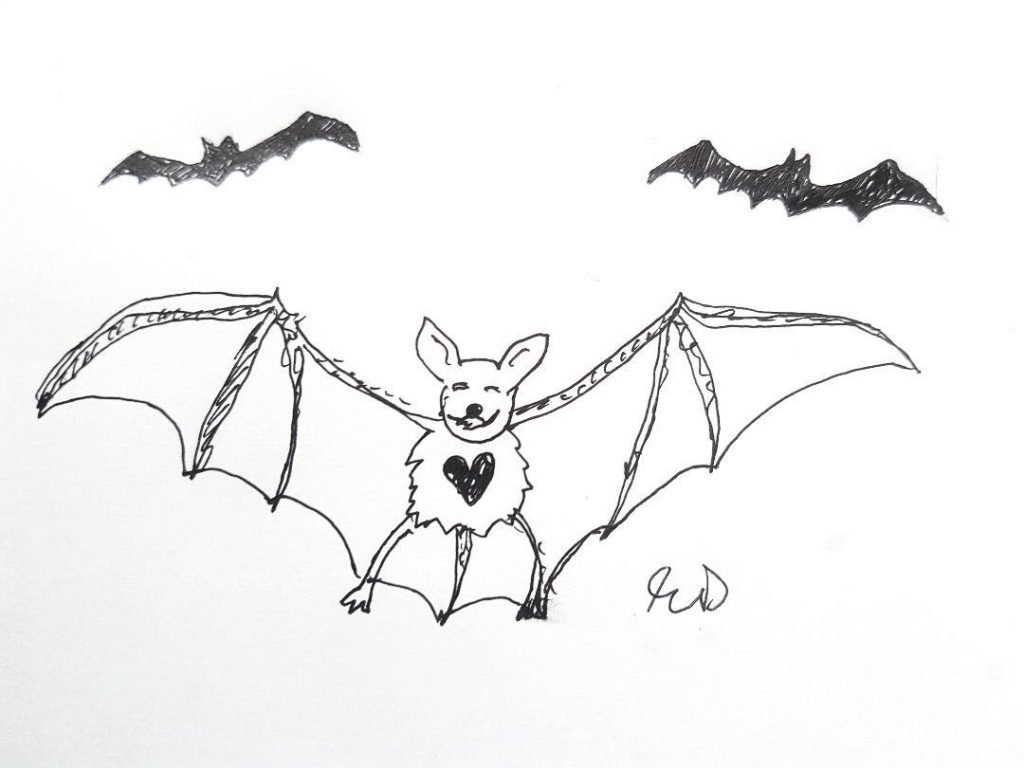Saluting our superheroes

In recent years I have had the wonderful experience of rehabilitating baby fruit bats that fell occasionally from the small colony roosting under an eave of the house.
Through consultation with experts while caring for these injured bat pups, I learned a lot about rehabilitative techniques and about usefulness of bats to our ecosystem.
I developed a special fondness for these gentle, responsive creatures with small furry bodies, soft clicking noises, endearing manner of gobbling up the fruits I had chewed and spat out for them (as their mother would) and their natural propensity for clinging to my chest for warmth and comfort, as they would with their mothers.
Most bat mothers have one baby at a time – thankfully, since the pup can weigh up to one third of her weight. This would be akin to a 40-50 pound human newborn. The average human mother sometimes struggles with even seven to 10 pounds of offspring in her arms or slung against her body. Comparatively, the mother bat is a maternal superhero, flying, swooping and foraging while her one-third-bodyweight pup clings with its mouth to her underarm nipple and attaches to her waist with its toes.
When weaned bat pups are too heavy to be carried, foraging mother bats leave them at the roost to be "babysat" by other females in the colony. It is the nature of bats to nurture each other – grooming, sharing food, caring for their sick and more. Our human societies would be remarkably healed and transformed if we could adopt even a percentage of the community closeness, care and compassion that bats possess and exhibit naturally.
A touching example of this community compassion was shared with me by friend and Trinidadian US-based bat expert, Geoffrey Gomes, founder of Trinibats: “We watched as a colony of nectar bats gathered around and protected an albino member of the group, to hide him from being seen by predators.”
For those who may not know, bats are usually dark in colour. Extremely rare, albino bats, with their bright white bodies, are easy targets for nocturnal predators like owls.
Some bats are insectivorous and, on a nightly basis, can consume up to half their body weight or more in insects (eg mosquitoes and crop-harming insects like moths and beetles), with pregnant females consuming more than double that amount. If just one bat can eat up to 1,200 mosquitoes in an hour, imagine the number an entire colony can consume!
As we in TT are now being encouraged to plant home gardens and embrace large-scale agriculture, bats should be appreciated and promoted as flying environmental superheroes, helping us to eradicate crop-eating insect pests without the use of insecticides.
The next time you enjoy a sapodilla, chennet, mango, paw paw, soursop or various other local fruits, thank bats. With their capacity to pollinate and disperse seeds, they ensure the continued presence of over 80 species of local trees, inclusive of seaside almond trees whose sand binding root systems prevent beach erosion – a benefit for nesting turtles.
Sadly, widespread fear of bats (based largely on myths, stereotypes and limited education) outweighs awareness of and appreciation for their irreplaceable and undeniable importance to our ecosystem.
With the current pandemic, this fear has increased. Many people refer to covid19 as "the bat virus," based on scientists’ belief that the virus originated in bats and spread to humans via an intermediary animal host (believed, but not confirmed, to be the pangolin).
Resulting panic has led to attempts in various countries to eradicate bat colonies by poisoning, burning and other torturous means. As a mother bat has only one to two pups annually, such slaughter causes tragic population crashes.
In one of the Government’s televised covid19 press conferences, a reporter raised the topic of coronavirus and animals, mentioning bats in particular as “being among the suspect group.”
In public forums like this it is important and responsible to clarify that the presence of bats in our environment will not "give us the virus." Au contraire, bats are here to help, not harm us. Please do not harm them!
“If we think that one particular animal is the cause of this pandemic, or future epidemics and pandemics, we are only fooling ourselves. Uncontrolled and/or unregulated exploitation of wild animals for meat, along with rampant habitat destruction, are the main malefactors here, and these activities are detrimental to us all.” (Trinibats)
I urge everyone with bat-related concerns and questions to contact Trinibats (via their Facebook page) for accurate, expert information.



Comments
"Saluting our superheroes"